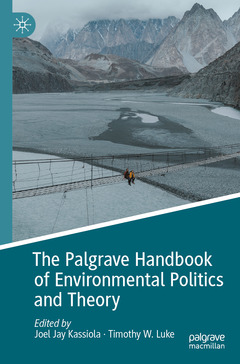Description
The Palgrave Handbook of Environmental Politics and Theory, 2023
Environmental Politics and Theory Series
Coordinators: Jay Kassiola Joel, Luke Timothy W.
Language: English
Subjects for The Palgrave Handbook of Environmental Politics and Theory:
Publication date: 03-2024
715 p. · 15.5x23.5 cm · Paperback
Publication date: 03-2023
715 p. · 15.5x23.5 cm · Hardback
Description
/li>Contents
/li>Biography
/li>Comment
/li>
This Handbook aims to provide a unique and convenient one-volume reference work, exhibiting the latest interdisciplinary explorations in this urgently burgeoning field of intellectual and practical importance. Due to its immense range and diversity, environmental politics and theory necessarily encompasses: empirical, normative, policy, political, organizational, and activist discussions unfolding across many disciplines. It is a challenge for its practitioners, let alone newcomers, to keep informed about the ongoing developments in this fast-changing area of study and to comprehend all of their implications. Through the planned volume?s extensive scope of contributions emphasizing environmental policy issues, normative prescriptions, and implementation strategies, the next generation of thinkers and activists will have very useful profiles of the theories, concepts, organizations, and movements central to environmental politics and theory. It is the editors? aspiration that this volume will become a go-to resource on the myriad perspectives relevant to studying and improving the environment for advanced researchers as well as an introduction to new students seeking to understand the basic foundations and recommended resolutions to many of our environmental challenges. Environmental politics is more than theory alone, so the Handbook also considers theory-action connections by highlighting the past and current: thinkers, activists, social organizations, and movements that have worked to guide contemporary societies toward a more environmentally sustainable and just global order.
Chapter ?Eco-Anxiety and the Responses of Ecological Citizenship and Mindfulness? is available open access under a Creative Commons Attribution 4.0 International License via link.springer.com.Chapter 1. Introduction: “The Time for Social and Political Transformation Based on the Environment is Now.”.- Chapter 2. Environmentalism and Political Ideologies.- Chapter 3 Democracy, Citizenship and Nationalism in Environmental Political Theory.- Chapter 4. Eco-anxiety and the Responses of Ecological Citizenship and Mindfulness.- Chapter 5. Biosphere Breaking Bad: The Imperatives of Deep Adaptation.- Chapter 6. Animal Citizens: Do We Need to Rethink the Status of Animals or Citizenship Itself?.- Chapter 7. Degrowth: A State of Depense.- Chapter 8. The Nature of the State: A Deep History of Agrarian Environmentalism.- Chapter 9. The Environmental Political Role of Counter-Hegemonic Environmental Ethics: Replacing Supremacist Ethics and Connecting Environmental Politics, Environmental Political Theory and Environmental Sciences.- Chapter 10. Critical Feminism: A Feminist Environmental Research Network (FERN) for Collaborative and Relational Praxis.- Chapter 11. Property and the Anthropocene: Why Power on Things is Central to Our Ecological Predicament.- Chapter 12. Ecosystem Policy and Law: A Philosophical Argument for the Anticipatory Regulation of Environmental Risk, etc.
Joel Jay Kassiola is Professor in the Department of Political Science at San Francisco State University, Department of Political Science, San Francisco, California, USA. He is the author of one of the first books in the emerging field of environmental political theory, The Death of Industrial Civilization and, more recently, editor of Explorations in Environmental Political Theory (2015). He serves as Series Editor for Palgrave's Environmental Politics and Theory book series.
These books may interest you

The Palgrave Kant Handbook 316.49 €

The Palgrave Fichte Handbook 179.34 €


